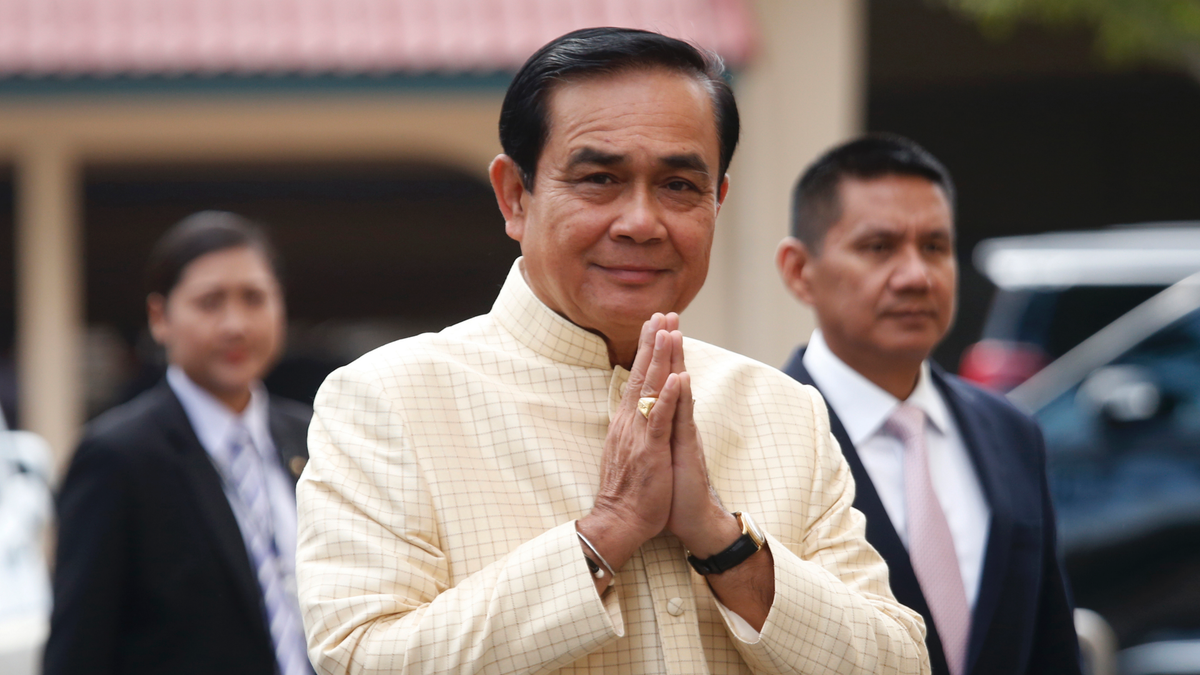
FILE - In this Tuesday, Sept. 11, 2018, file photo, Thai Prime Minister Prayuth Chan-ocha, center, arrives at the government house for a cabinet meeting in Bangkok, Thailand. Prayuth on Monday declared that he is “interested” in the country’s politics, providing further indication that he will run in elections scheduled for early next year. (AP Photo/Sakchai Lalit, File)
BANGKOK – The head of Thailand's military government declared Monday he is "interested" in participating in politics, in a new indication he may seek to remain in office after elections scheduled for early next year.
Prime Minister Prayuth Chan-ocha's remarks did not clarify whether he is considering running in the general election, which is tentatively scheduled for Feb. 24 next year, or will seek to be appointed by the new parliament as a non-elected outsider prime minister.
Prayuth disavowed political ambitions when he led a May 2014 coup that ousted an elected government. The military declared it would reform politics to get rid of corruption, and banned political party organizing until earlier this month
"I can say right now that I'm interested in political positions," Prayuth told reporters at Government House.
For several months, Prayuth and his backers have been organizing support among pro-military parties, and at least three political groups have declared they will support Prayuth to become prime minister. Prayuth has also been making trips to provincial areas that strongly resemble campaign stops. Although the election is tentatively scheduled for Feb. 24, it can legally be held as late as early May.
Blood ran in the streets of Bangkok the last time a coup leader went back on his vow not to become an unelected prime minister. Gen. Suchinda Kraprayoon led a 1991 coup that ousted elected Prime Minister Chatichai Choonhavan, then curried favor among several parties that formed a coalition government after a 1992 election and named him prime minister.
Outraged pro-democracy protesters took to the streets to demand Suchinda resign, but instead he called out the army to disperse them by force, killing scores in events that became known as "Bloody May." Suchinda stepped down amid high tension after he and a protest leader were chastised on a live television broadcast by then King Bhumibol Adulyadej.
Prayuth's first open admission that he saw himself as more than a coup leader came in January this year when he said, "I am a politician who used to be a soldier." He said he never wanted to become a politician but did so because of a "sense of responsibility."
On Monday, Prayuth said "I can use these words now: 'I am interested in politics,' because I love my country, probably like every Thai in the country."
"What I'll decide, whom I'll support, I'll need some more time," Prayuth said, adding that he had no immediate plans to resign from his position as junta leader. The junta, which holds power above the government, is set to be dissolved after an elected government comes to power.
Prayuth's junta has also pushed through laws that weaken democratic structures with the intention of limiting the power of elected politicians and keeping it in the hands of traditional Thai powerholders, including the judiciary and the military.
